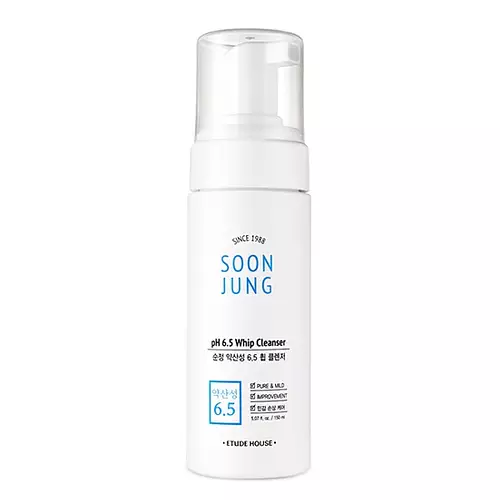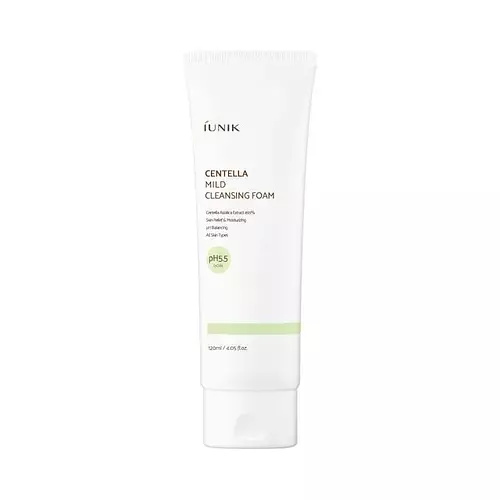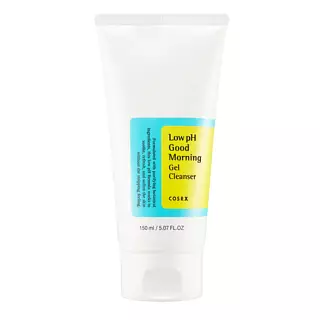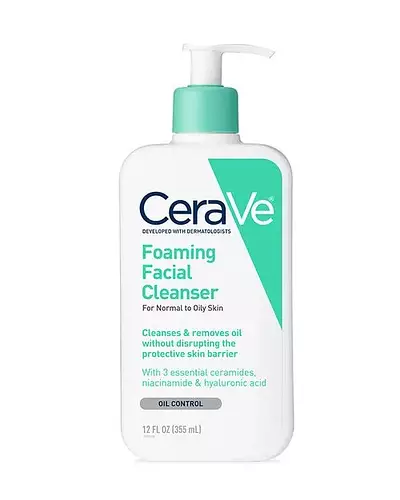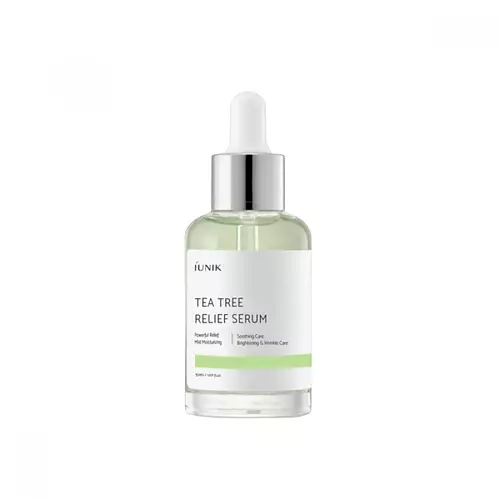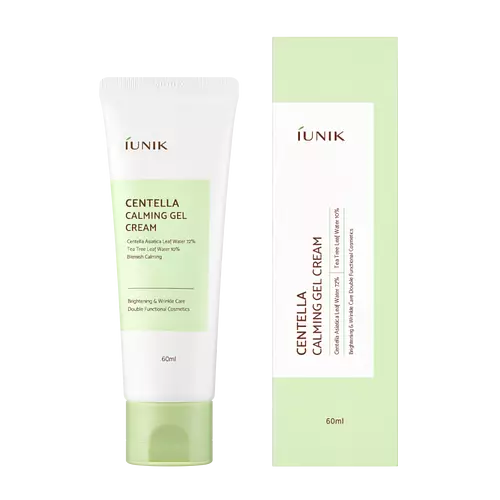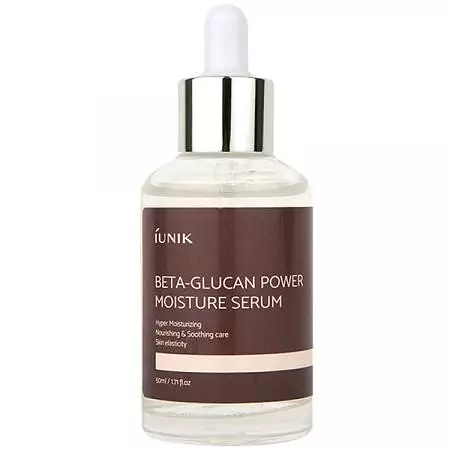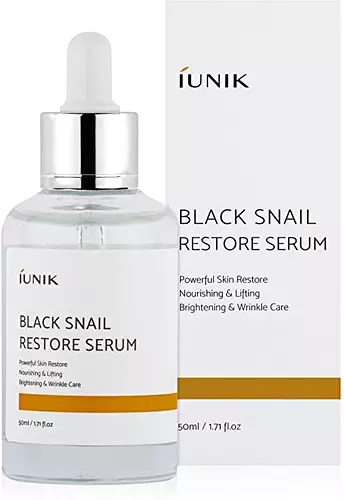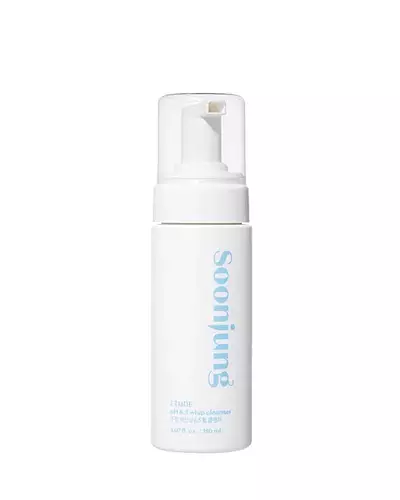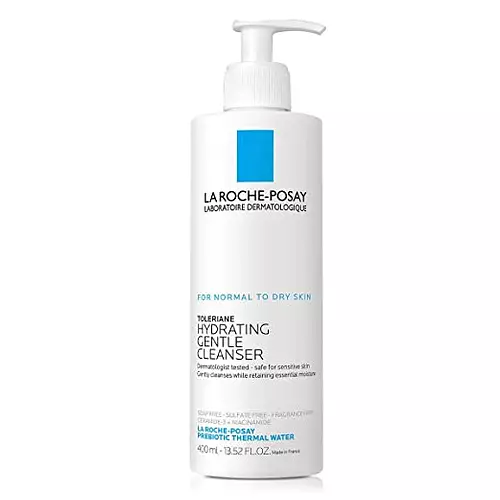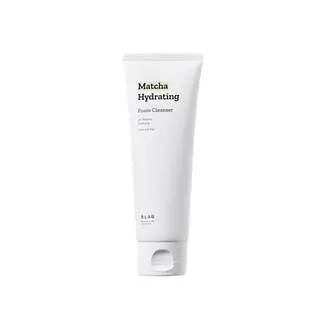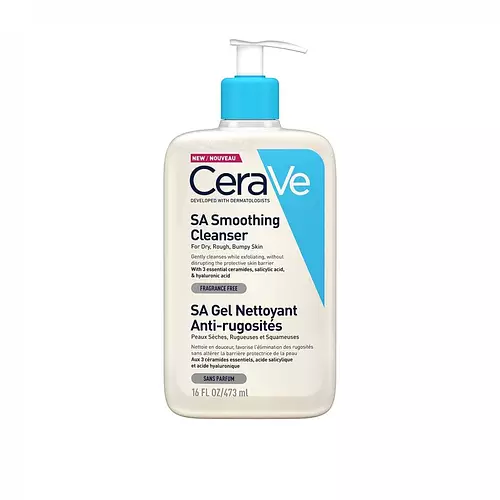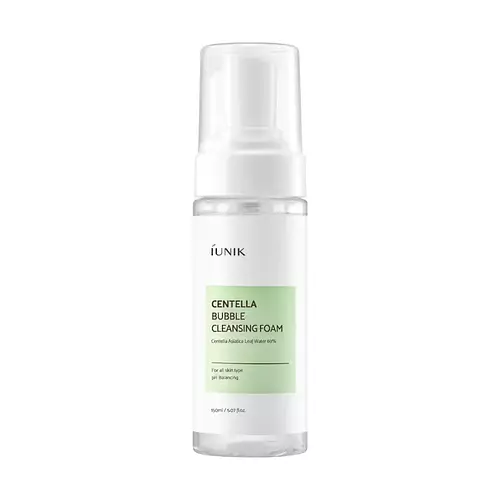
iUNIK Centella Bubble Cleansing Foam Ingredients Explained
There is an older formulation of this product:
Overview
What it is
Face cleanser with 24 ingredients
Cool Features
It is cruelty-free, fungal acne (malassezia) safe, and reef safe
Suited For
It has ingredients that are good for dry skin, brightening skin, sensitive skin, oily skin and scar healing
Free From
It doesn't contain any harsh alcohols, common allergens, oils, parabens, silicones or sulfates
Fun facts
iUNIK is from South Korea. This product is used in 240 routines created by our community.
We independently verify ingredients and our claims are backed by peer-reviewed research. Does this product need an update? Let us know.
Face cleanser with 24 ingredients
Quick info
You should know
Benefits
This product contains 1 ingredient that may have this attribute:
This product contains 1 ingredient that may have this attribute:
This product contains 2 ingredients that may have this attribute:
This product contains 1 ingredient that may have this attribute:
This product contains 1 ingredient that may have this attribute:
This product contains 1 ingredient that may have this attribute:
Concerns
This product contains 1 ingredient that may have this attribute:
This product contains 1 ingredient that may have this attribute:
This product contains 2 ingredients that may have this attribute:
This product contains 1 ingredient that may have this attribute:
Ingredients 24
Centella Asiatica Leaf Water is created by distilling centella asiatica leaves. Centella Asiatica is a herb native to Southeast Asia.
Water. It's the most common cosmetic ingredient of all. You'll usually see it at the top of ingredient lists, meaning that it makes up the largest part of the product.
Chances are, you eat sodium chloride every day. Sodium Chloride is also known as table salt.
1,2-Hexanediol is a multi-tasker ingredient. It acts as a preservative to increase shelf-life and can aid other preservatives in preventing microbe growth. 1,2-Hexanediol also helps the skin retain moisture as a humectant.
Pentylene glycol is typically used within a product to thicken it. It also adds a smooth, soft, and moisturizing feel to the product. It is naturally found in plants such as sugar beets.
Butylene Glycol (or BG) is used within cosmetic products for a few different reasons:
Caprylyl Glycol is a humectant and emollient, meaning it attracts and preserves moisture.
Trehalose is a disaccharide made of two glucose molecules (glucose is sugar!). Trehalose is used to help moisturize skin. It also has antioxidant properties.
Allantoin plays a role in soothing and moisturizing the skin. Because of this, it is often added to products with strong active ingredients.
Disodium Cocoamphodiacetate is a surfactant and helps cleanse skin. It is created from the fatty acids of coconut oil.
Hexylene Glycol is a surfactant. Glycols are a class of alcohols. Hexylene Glycol is a surfactant and emulsifier.
Polyglyceryl-4 Caprate comes from Capric Acid and Polyglycerin-4. It is an emulsifier.
Citric Acid is an AHA derived from citrus fruits (think oranges, lemons, and limes!).
Glycerin is already naturally found in your skin. It helps moisturize and protect your skin.
This ingredient is created by distilling parts of the tea tree plant. The bark and leaves of the tea tree plant are rich in Terpinen, an antioxidant, antibacterial, and anti-inflammatory ingredient.
Oryza Sativa Bran Extract comes from the outer layer of a rice kernel. It is a byproduct of milling rice, or the operation to produce a whole grain rice product.
Portulaca Oleracea Extract is an extract of the whole plant of the Purslane, Portulaca oleracea L., Portulacaceae. It has anti-inflammatory, antioxidant, and hydrating properties.
Glycyrrhiza Glabra Root Extract is an extract of the roots of Licorice. It has been found to have several benefits such as skin hydrating, conditioning, and soothing.
Ethylhexylglycerin (we can't pronounce this either) is commonly used as a preservative and skin softener. It is derived from glyceryl.
Parfum is a catch-all term for an ingredient or more that is used to give aroma to products. Parfum, or fragrance, can be a blend of hundreds of chemicals or plant oils. This means every product with "fragrance" or "Parfum" in the ingredients list is a different mixture.
Centella Asiatica Leaf Water, Water, Sodium Chloride, 1,2-Hexanediol, Pentylene Glycol, Butylene Glycol, Caprylyl Glycol, Trehalose, Allantoin, Disodium Cocoamphodiacetate, Hexylene Glycol, Tea-Cocoyl Glutamate, Polyglyceryl-4 Caprate, Citric Acid, Glycerin, Melaleuca Alternifolia Leaf Water, Oryza Sativa Bran Extract, Portulaca Oleracea Extract, Perilla Frutescens Leaf Extract, Aspalathus Linearis Extract, Commiphora Myrrha Resin Extract, Glycyrrhiza Glabra Root Extract, Ethylhexylglycerin, Parfum
Ingredient Ratings
Based on the number of likes and dislikes each ingredient has received.
Ingredients Explained
Centella Asiatica Leaf Water is created by distilling centella asiatica leaves. Centella Asiatica is a herb native to Southeast Asia.
Many active components found in Centella Asiatica Extract, such as Madecassic Acid and Asiaticoside, encourage the skin to naturally produce hyaluronic acid. This helps keep our skin hydrated. Many of these components also show antioxidant activity and may help reduce the signs of aging.
Other components of Centella Asiatic Extract include Vitamin A, vitamin C, several B vitamins, and Asiatic Acid.
Learn more about Centella Asiatica Leaf WaterWater. It's the most common cosmetic ingredient of all. You'll usually see it at the top of ingredient lists, meaning that it makes up the largest part of the product.
So why is it so popular? Water most often acts as a solvent - this means that it helps dissolve other ingredients into the formulation.
You'll also recognize water as that liquid we all need to stay alive. Talk about multi-purpose! If you see this, drink a glass of water. Stay hydrated!
Learn more about WaterChances are, you eat sodium chloride every day. Sodium Chloride is also known as table salt.
This ingredient has many purposes in skincare: thickener, emulsifier, and exfoliator.
You'll most likely find this ingredient in cleansers where it is used to create a gel-like texture. As an emulsifier, it also prevents ingredients from separating.
There is much debate on whether this ingredient is comedogenic. The short answer - comedogenic ratings don't tell the whole story. Learn more about comegodenic ratings here.
The concensus about this ingredient causing acne seems to be divided. Research is needed to understand if this ingredient does cause acne.
Scrubs may use salt as the primary exfoliating ingredient.
Learn more about Sodium Chloride1,2-Hexanediol is a multi-tasker ingredient. It acts as a preservative to increase shelf-life and can aid other preservatives in preventing microbe growth. 1,2-Hexanediol also helps the skin retain moisture as a humectant.
In products that are water-based, this ingredient can help stabilize perfumes and fragrances. It can also help make the texture of products softer and more smooth.
Pentylene glycol is typically used within a product to thicken it. It also adds a smooth, soft, and moisturizing feel to the product. It is naturally found in plants such as sugar beets.
The hydrophilic trait of Pentylene Glycol makes it a humectant. As a humectant, Pentylene Glycol helps draw moisture from the air to your skin. This can help keep your skin hydrated.
This property also makes Pentylene Glycol a great texture enhancer. It can help thicken or emulsify a product. Emulsifiers help stabilize a product. It does this by preventing certain ingredients from separating.
Pentylene Glycol also acts as a mild preservative and helps to keep a product microbe-free.
Some people may experience mild eye and skin irritation from Pentylene Glycol. We always recommend speaking with a professional about using this ingredient in your routine.
Pentylene Glycol has a low molecular weight and is part of the 1,2-glycol family.
Learn more about Pentylene GlycolButylene Glycol (or BG) is used within cosmetic products for a few different reasons:
- It is a solvent, meaning that it helps to dissolve other ingredients. This also enhances the absorption of the product into one's skin.
- It is a humectant, which means that it helps attract moisture into the skin.
- It helps improve product application.
Overall, Butylene Glycol is a safe and well-rounded ingredient. It is unlikely to irritate skin, and works well with pretty much all other ingredients.
Caprylyl Glycol is a humectant and emollient, meaning it attracts and preserves moisture.
It is a common ingredient in many products, especially those designed to hydrate skin. The primary benefits are retaining moisture, skin softening, and promoting a healthy skin barrier.
Though Caprylyl Glycol is an alcohol derived from fatty acids, it is not the kind that can dry out skin.
This ingredient is also used as a preservative to extend the life of products. It has slight antimicrobial properties.
Learn more about Caprylyl GlycolTrehalose is a disaccharide made of two glucose molecules (glucose is sugar!). Trehalose is used to help moisturize skin. It also has antioxidant properties.
As a humectant, trehalose helps draw moisture from the air to your skin. This helps keep your skin hydrated.
Due to its antioxidant properties, trehalose may help with signs of aging. Antioxidants help fight free-radical molecules, unstable molecules that may damage your skin.
In medicine, trehalose and hyaluronic acid are used to help treat dry eyes.
Some animals, plants, and bacteria create trehalose as a source of energy to survive freeze or lack of water.
Learn more about TrehaloseAllantoin plays a role in soothing and moisturizing the skin. Because of this, it is often added to products with strong active ingredients.
Some studies have shown this ingredient can promote wound healing with higher concentrations.
Allantoin is derived from the comfrey plant but produced synthetically for cosmetic products to ensure purity.
Learn more about AllantoinDisodium Cocoamphodiacetate is a surfactant and helps cleanse skin. It is created from the fatty acids of coconut oil.
Surfactants help rinse oil, dirt, and other pollutants easily from skin. It has a faint fruit-like scent.
Hexylene Glycol is a surfactant. Glycols are a class of alcohols. Hexylene Glycol is a surfactant and emulsifier.
As a surfactant, Hexylene Glycol helps gather dirt and oil on your skin to be washed away.
As an emulsifier, Hexylene Glycol helps keep water and oil together. This prevents them from separating in a product. Hexylene Glycol also thins out the texture of a product by lessening viscosity.
Hexylene Glycol has a small molecular weight.
Learn more about Hexylene GlycolWe don't have a description for Tea-Cocoyl Glutamate.
Polyglyceryl-4 Caprate comes from Capric Acid and Polyglycerin-4. It is an emulsifier.
Emulsifiers help stabilize a product. They do this by preventing ingredients from separating, such as oils and water which do not mix naturally.
Citric Acid is an AHA derived from citrus fruits (think oranges, lemons, and limes!).
If you spot Citric Acid near the end of an ingredient list, it's likely there as a pH adjuster rather than an active ingredient.
As an AHA, Citric Acid removes the top layer of skin cells from the newer layer of skin underneath. This helps skin to remove dark spots and look more even.
Read more about some other popular AHA's here:
Learn more about Citric AcidGlycerin is already naturally found in your skin. It helps moisturize and protect your skin.
A study from 2016 found glycerin to be more effective as a humectant than AHAs and hyaluronic acid.
As a humectant, it helps the skin stay hydrated by pulling moisture to your skin. The low molecular weight of glycerin allows it to pull moisture into the deeper layers of your skin.
Hydrated skin improves your skin barrier; Your skin barrier helps protect against irritants and bacteria.
Glycerin has also been found to have antimicrobial and antiviral properties. Due to these properties, glycerin is often used in wound and burn treatments.
In cosmetics, glycerin is usually derived from plants such as soybean or palm. However, it can also be sourced from animals, such as tallow or animal fat.
This ingredient is organic, colorless, odorless, and non-toxic.
Glycerin is the name for this ingredient in American English. British English uses Glycerol/Glycerine.
Learn more about GlycerinThis ingredient is created by distilling parts of the tea tree plant. The bark and leaves of the tea tree plant are rich in Terpinen, an antioxidant, antibacterial, and anti-inflammatory ingredient.
Learn more about tea tree benefits here.
Oryza Sativa Bran Extract comes from the outer layer of a rice kernel. It is a byproduct of milling rice, or the operation to produce a whole grain rice product.
Oryza Sativa Bran Extract is moisturizing. This is due to its components of polysaccharides and omega-3 fatty acids. It also contains calcium, selenium, phosphorus, iron, and zinc.
Oryza Sativa Bran Extract contains numerous antioxidants such as ferulic acid. Antioxidants help fight free-radical molecules. Free-radical molecules are capable of damaging our cells and other genetic material.
Learn more about Oryza Sativa Bran ExtractPortulaca Oleracea Extract is an extract of the whole plant of the Purslane, Portulaca oleracea L., Portulacaceae. It has anti-inflammatory, antioxidant, and hydrating properties.
Purslane is very nutritious. It contains omega-3 fatty acids, NMFs, many vitamins, minerals, and antioxidants. The vitamins found in purslane include: Vitamin C, Vitamin A, and Vitamin E.
Purslane is a succulent with an extensive habitat. It is used in traditional Korean medicine to treat irritated skin.
Nowadays, it is becoming a superfood due to its highly nutritious content.
Learn more about Portulaca Oleracea ExtractWe don't have a description for Perilla Frutescens Leaf Extract.
We don't have a description for Aspalathus Linearis Extract.
We don't have a description for Commiphora Myrrha Resin Extract.
Glycyrrhiza Glabra Root Extract is an extract of the roots of Licorice. It has been found to have several benefits such as skin hydrating, conditioning, and soothing.
One component, glabridin, has extra potent antioxidant and soothing properties. It has also been found to block pigmentation from UVB rays in guinea pigs.
Licorice Root also contains a flavonoid. Flavonoids are a natural substance from in plants. Flavonoids also have antioxidant properties.
Another component, glycyrrhizin, has been found to have anti-inflammatory and antimicrobial benefits. This may make licorice root extract effective at treating acne. However, more research is needed to support this.
Liquiritin is one of the flavone compounds found in licorice. It has been found to help lighten skin by preventing tyrosinase from reacting with tyrosine. When the two react, protein is converted to melanin. Melanin is the substance in your body that gives your features pigmentation.
Learn more about Glycyrrhiza Glabra Root ExtractEthylhexylglycerin (we can't pronounce this either) is commonly used as a preservative and skin softener. It is derived from glyceryl.
You might see Ethylhexylglycerin often paired with other preservatives such as phenoxyethanol. Ethylhexylglycerin has been found to increase the effectiveness of these other preservatives.
Parfum is a catch-all term for an ingredient or more that is used to give aroma to products. Parfum, or fragrance, can be a blend of hundreds of chemicals or plant oils. This means every product with "fragrance" or "Parfum" in the ingredients list is a different mixture.
In the US, the alternative name for parfum is 'fragrance'. The term 'fragrance' is not regulated in many countries. In many cases, it is up to the brand to define this term.
For instance, many brands choose to label themselves as "fragrance-free" because they are not using synthetic fragrances. However, their products may still contain ingredients such as essential oils that are considered a fragrance. One example is Calendula flower extract. Essential oil ingredients still impart a scent or 'fragrance'.
Depending on the blend, it can cause allergies and sensitivities on the skin. Some ingredients that are known EU allergens include linalool and citronellol.
Products use parfum often to give products a scent or cover up smells of different ingredients.
The bottom line is: not all fragrances/parfum/ingredients are created equally. If you are worried about fragrances, we recommend taking a closer look at an ingredient. And of course, we always recommend speaking with a professional.
Learn more about ParfumReviews
Pronicio
It's a very good cleanser in general, its foamy texture is very pleasant, it gives a refreshed look and has a very mild, light scent. It cleanses...
It's a very good cleanser in general, its foamy texture is very pleasant, it gives a refreshed look and has a very mild, light scent. It cleanses very well but leaves the skin a little dry, so I wouldn't recommend it if you have dehydrated skin.
Compared With
Here are some products that it's often compared with
More iUNIK Products
See all iUNIK productsMore Face Cleansers
See all face cleansersWe're dedicated to providing you with the most up-to-date and science-backed ingredient info out there.
The data we've presented on this page has been verified by a member of the SkinSort Team.
Read more about us




